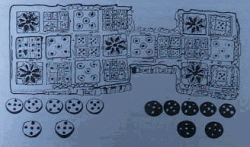What are the Odds?
Many events in life appear to be pure luck. To explain these events some people turn to religion and the belief in a greater power controlling the world. However, mathematics gives alternative ways of explaining and reasoning why it is certain events occur.
Probability.
Probability is defined as " A quantitative measure of the likelihood of a given event". In other words, probability is a way of expressing the odds of a certain event taking place. In probability, the likelihood of an event occuring is expressed in percentages. Zero persent means that there is no chance that the event will occur, while one hundred percent means that the event will definitley occur. To determine these percentages, there are a variety of laws that govern probability.
The Law of Unions:
This law is important when determining the probabilty of two events occuring. The formula for this law is: the probability of two events happening, minus the probability that both events occur. For example, let's say that you were asked to find the probabilty that out of one deck of cards, you would pick either an ace or a heart. In this case you would do the probability of a heart plus the probability of an ace, minus the probability of the ace of hearts.
Independence of Events:
In probability, it is important to note that not all event are related to each other. If a person flipped a coin ten times, they would be just as likely to land on heads the first time as they would be the tenth time. These events are what mathematicians call memoryless becuase the successive events are independent of each other. Other events that have no effect on each other are often seperated by time and space.
The Law of Unions:
This law is important when determining the probabilty of two events occuring. The formula for this law is: the probability of two events happening, minus the probability that both events occur. For example, let's say that you were asked to find the probabilty that out of one deck of cards, you would pick either an ace or a heart. In this case you would do the probability of a heart plus the probability of an ace, minus the probability of the ace of hearts.
Independence of Events:
In probability, it is important to note that not all event are related to each other. If a person flipped a coin ten times, they would be just as likely to land on heads the first time as they would be the tenth time. These events are what mathematicians call memoryless becuase the successive events are independent of each other. Other events that have no effect on each other are often seperated by time and space.
Is it really a COINCIDENCE?
Do you think that it is weird when you meet someone that has the same birthday as you? Does it surprise you if a person you're sitting next to on a train likes the same music as you? In this interesting youtube video it explains why many things in life that we label as bizarre coincidences might not be so bizzare.
The Start of Probability.
The Game of 20 Squares

There is evidence that people have used the idea of probability in games and as a decision making tool for five thousand years. While excavating tombs in the ancient cilivilization Mesopotamia, archaeologists unearthed an intact board game along with written references how to play the game. The game is called "The Game of Twenty Squares". In this game there are two peolpe who have to move their pieces across the board of twenty squares. The amount of spaces each player can move their pieces depends on what number they roll with a pair of dice. Winning this game mostly involves getting luvky with rolling the dice and strategizing which piece to move.
